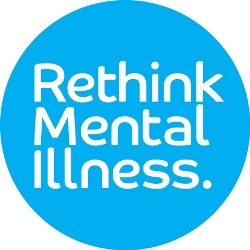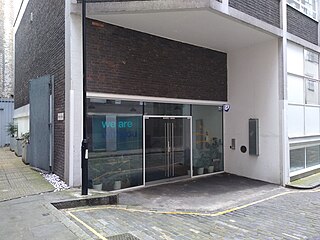Victim Support is an independent charity in England and Wales that provides specialist practical and emotional support to victims and witnesses of crime.

Mind is a mental health charity in England and Wales. It was founded in 1946 as the National Association for Mental Health (NAMH).
Spurgeons is a large national children's charity in the United Kingdom, working with vulnerable families, children and young people. It is based in Rushden, with several offices in the UK, and is a registered charity.
Neighbourhood Watch in the United Kingdom is the largest voluntary crime prevention movement covering England and Wales with upwards of 2.3 million household members. The charity brings neighbours together to create strong, friendly and active communities in which crime can be tackled. Neighbourhood Watch Network is the umbrella organisation supported by the Home Office to support Neighbourhood Watch groups and individuals across England and Wales.

Rethink Mental Illness Is a British charity that seeks to improve the lives of severely mentally ill people.
The Howard League for Penal Reform is a registered charity in the United Kingdom. It is the oldest penal reform organisation in the world, named after John Howard. It was founded as the Howard Association in 1866 and changed its name in 1921, following a merger with the Penal Reform League. The charity focuses on penal reform in England and Wales.

Forensic social work is the application of social work to questions and issues relating to the law and legal systems. It is a type of social work that involves the application of social work principles and practices in legal, criminal, and civil contexts. It is a specialized branch of social work that focuses on the intersection of law and mental health. Forensic social work is an important part of the criminal justice system and provides an important link between mental health and the legal system.

We Are With You are a British charity founded in 1967 that support people to make positive behavioural changes, most notably with alcohol abuse, drug misuse, and mental health. The charity works extensively throughout England and Scotland, with an administrative base in Farringdon, central London. Previously named Addaction, it changed its name to We Are With You in February 2020.
Change Grow Live (CGL) is a voluntary sector organisation specialising in substance misuse and criminal justice intervention projects in England and Wales. All of its funding is statutory-based. As of 2012 the organisation employed over 1,800 workers and was supported by over 250 volunteers. CGL was formerly named Crime Reduction Initiatives (CRI), but changed its name in 2016.

Richmond Fellowship is a charity and voluntary sector provider of mental health services in England, the United States and Hong Kong. Established in 1959, it serves over 9,000 people in England every year.
Together for Mental Wellbeing is a UK charity working in mental health. Until 2005 it was known as the Mental After Care Association (Maca).

The Centre for Mental Health is an independent mental health charity in the United Kingdom. It aims to inspire hope, opportunity and a fair chance in life for people of all ages with or at risk of mental ill health. The centre acts as a bridge between the worlds of research, policy and service provision and believes strongly in the importance of high-quality evidence and analysis. It encourages innovation and advocates for change in policy and practice through focused research, development and training.

United Response is a charity operating in England and Wales, providing a range of support and services for around 2,000 people with learning disabilities, mental health needs, or physical disabilities.

The Association of Mental Health Providers (AMHP), known until May 2017 as Mental Health Providers Forum (MHPF), is a registered charity based in London and the representative body for voluntary and community sector mental health organisations in England and Wales, working nationally and regionally to influence practice and policy. It aims to improve the range and quality of mental health services by increasing the involvement of the voluntary sector in delivering them, working in partnership with the wider sector and government agencies. Specific projects include the promotion of innovation in the sector, evidencing best practice to achieve the best outcomes for individuals and supporting recovery.
The National Mental Health Development Unit (NMHDU) was a governmental organisation in England charged with supporting the implementation of mental health policy. The unit worked to achieve this by advising on best practice for improving mental health and mental health services. NMHDU closed on 31 March 2011.
Disability hate crime is a hate crime which involves the use of violence against people with disabilities. This form of violence is not only violence in a physical sense, it also includes other hostile acts, such as the repeated blocking of disabled access and verbal abuse. These hate crimes are associated with prejudice against a disability, or a denial of equal rights for disabled people. It is viewed politically as an extreme form of ableism, or disablism. This phenomenon can take many forms, from verbal abuse and intimidatory behaviour to vandalism, assault, or even murder. Although data are limited studies appear to show that verbal abuse and harassment are the most common. Disability hate crimes may take the form of one-off incidents, or may represent systematic abuse which continues over periods of weeks, months, or even years. Disabled parking places, wheelchair access areas and other facilities are frequently a locus for disability hate. Instead of seeing access areas as essential for equity, they are seen instead as 'special treatment', unjustifiable by status, and so a 'reason' for acting aggressively. Denial of access thus demonstrates a prejudice against equal rights for disabled people; such actions risk actual bodily harm as well as limiting personal freedom.
The Centre for Crime and Justice Studies (CCJS) is a charity based in the United Kingdom focusing on crime and the criminal justice system. It seeks to bring together people involved in criminal justice through various means, including publications, conferences, and courses.
Shared Lives, which is also known as Adult Placement in some areas, is a UK form of support and accommodation for adults with need wherein approved individuals or families open their lives to aid older or disabled persons.

Safe Horizon, formerly the Victim Services Agency, is the largest victim services nonprofit organization in the United States, providing social services for victims of abuse and violent crime. Operating at 57 locations throughout the five boroughs of New York City. Safe Horizon provides social services to over 250,000 victims of violent crime and abuse and their families per year. It has over 800 employees, and has programs for victims of domestic violence, child abuse, sexual assault, and human trafficking, as well as homeless youth and the families of homicide victims. Safe Horizon's website has been accessible for the Spanish-speaking population since 2012. Safe Horizon has an annual budget of over $63 million.

Agenda is a UK-based charity which campaigns for women and girls at risk. The charity aims to highlight the needs of what it considers to be the most excluded women and girls: those who have experienced extensive violence, abuse, Psychological trauma, and economic inequality, including problems such as homelessness, incarceration, addiction, serious mental health issues, engagement in prostitution, and other forms of disadvantage. The organisation has 53 members, a mix of charities working with women across the various issues Agenda seeks to address.









